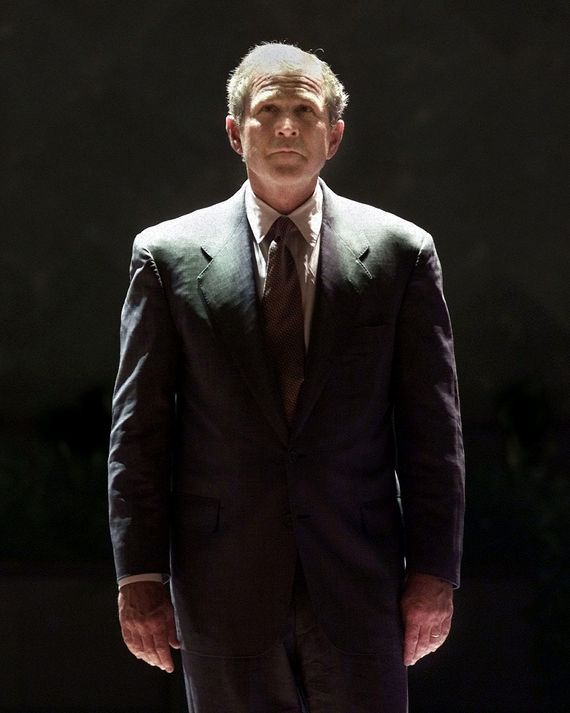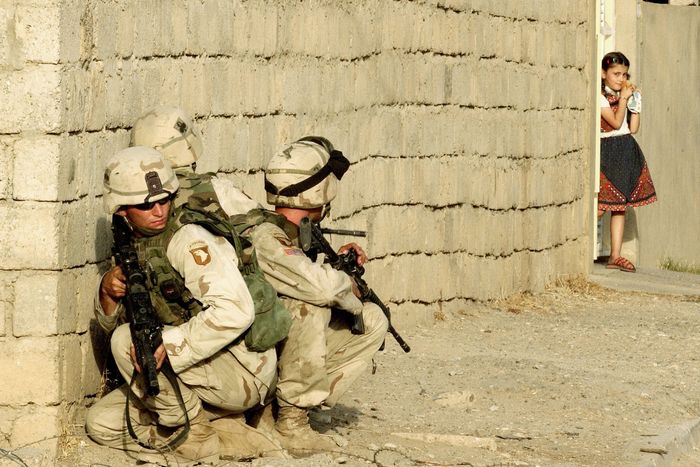
I am not an art critic, but I don’t think George W. Bush’s new portraits are very good. They inspire nothing but malaise and communicate a dilettante energy. Painting is to Bush what politics used to be: a hobby for a wealthy man. Yet there is something revelatory about them, though this may be unintentional on the part of the artist. For his new book, Out of Many, One, Bush has selected immigrants for his subjects. Most are well-known, wealthy or established in some way, as if the American dream requires an M.B.A. One is Henry Kissinger, whom Bush describes as a “good friend.” Kissinger is by rights a war criminal, responsible for an American bombing campaign that murdered tens of thousands of Cambodian civilians. Here Bush’s hand slips, just a little. Amnesia is as beneficial to Bush as it is to Kissinger. Bush’s body count may even exceed that of his friend were they ever to compare notes.
The reality of the Bush legacy is at painful odds with his post-presidential reputation. That discrepancy isn’t news. Here is what we know about Bush. Ever so eager to establish himself as the avatar of something he calls “compassionate conservatism,” he is responsible for torture and death on a mass scale. Because these abuses did not occur on American shores, did not target American citizens, the political class has decided to pretend the death does not matter. Bush has assumed the role of elder statesman, a sensible voice in a Republican party gone mad. His complicity is fading out of view.
A recent work of hagiography from CBS This Morning only affirmed Bush’s status as the foremost survivor in American politics. In an interview with Norah O’Donnell, Bush held forth at length about his painting — he was inspired by Churchill, he said — and condemned the Capitol siege, one of the simpler acts a political figure may perform. There are still compassionate conservatives, he assured O’Donnell. “Absolutely. I’m one. And I think there are a lot,” he said. He’s right, actually, in his way. Compare Bush to Donald Trump and there are certain tonal differences. Bush’s old money mannerisms do not permit him to call anyone a “bad hombre,” he did not mock anyone with a disability while campaigning, and he did not rant and rave about the fake news media.
Beyond these superficial differences, Trump and Bush are more alike than they are different. “Compassionate conservatism is first and foremost springing from the heart,” Bush said during his first run for the presidency. The heart contains multitudes. Malice can spring forth from its depths, too. What does it mean, after all, to be compassionate and then to be a conservative? Bush set the example. To be a compassionate conservative was to oppose marriage rights for LGBT people and abortion rights for women. To lie as recklessly as Trump ever did and lead the country into illegal war. To torture. Bush can condemn the January 6 insurrection and Trump’s rhetoric along with it, but he’s hardly an innocent. Years after Bush left office, Trump would take a middling position against the war in Iraq — and reaped the reward. Trump built on a foundation Bush laid.
Even Bush’s book, with its emphasis on friendly immigrant faces, betrays an inability or willing refusal to cope with the sins of his past. For all the times Bush condemned Islamophobia, he did plenty else to stoke it. To speak of an “axis of evil” was to use language freighted with deep meaning. Bush and his speechwriters invoked Hitler and Fascism, and applied the analogy to two majority-Muslim countries that hadn’t attacked ours. People shortened the sentence. They heard “evil” and recognized Islam. Bush did not just go to war with Afghanistan and Iraq, the nations; he took on spiritual enemies in a civilizational conflict and undercut his own warnings against Islamophobia. Bush can’t paint his way out of his legacy, though it seems he’d like to try.
In an era marked by the GOP’s steady march to the far right, the hunt for some vestigial sanity in the conservative movement leads many pundits astray. It’s easier to praise Bush than it is to grasp what he signifies. If Bush is our best example of a compassionate conservative, what does that say of the movement he represents — and what, too, does it indicate about the office he once held? The presidency was broken before Trump occupied it, and so was the GOP, and so was the conservative movement. And lest anyone think I am prepared to let the Democrats escape, the opposition is broken, too. A class eager to raise Bush up to the authoritative heights he enjoys cannot notice incipient fascism, let alone devise a sensible response. Bush, of course, locates the problem elsewhere. Speaking of his friendship with Michelle Obama, he told O’Donnell, “I think it’s a problem that Americans are so polarized in their thinking that they can’t imagine a George W. Bush and a Michelle Obama being friends.”
The problem isn’t that some people are outraged by Bush but that many people are not. There are people we shouldn’t befriend, and the president responsible for the torture memos ought to rank somewhere in the top five. (Save a spot for his good friend, Kissinger.) We decide what we tolerate, and a society that lets George W. Bush go anywhere without a shrieking Greek chorus to remind him of his body count isn’t good for much at all.
Someone might interject here and in true Sorkin-esque form say the presidency requires difficult decisions from its occupants. The presidency can induce a moral recklessness in people who consider themselves politically wise. In the eyes of some, the office is so meaningful that it mandates the absolution of all who occupy it. Maybe these people really are wise, in the same way that Bush really is a compassionate conservative. To be astute politically requires no great ethical commitments of a person. Impunity is the foundational value of Capitol Hill. Liberals believe it’s a tit for tat relationship, I’ll forgive your guy if you forgive mine, but as is generally the case, they are outclassed by their opposition. Bipartisanship is asymmetric. The right will recall everything it despised about Barack Obama until the sun dies. Liberals believe so strongly in the political institutions that empowered Bush and Trump they can do nothing but move on, will forgive those same institutions of anything, will destroy themselves in their inability to admit the truth.
Michelle Obama can hug Bush as much as she wants, and each time she does, it’s a concession. Purchase Bush’s insipid portraiture; it’s a concession. Each gentle interview is a concession too. Compassionate conservatives run interference for the darkest impulses of the GOP. “Please put aside all the harsh rhetoric about immigration,” Bush implored his party on television, and added, “Please put aside trying to score political points on either side.” Bush is concerned with aesthetics, can’t quite say that his party is almost wholly consumed by prejudice and rage and a small-minded kind of fear of the other. Instead, he must blame polarization and both sides must be complicit. For all Bush’s erstwhile talk about personal responsibility, he applies it infrequently to himself and to his peers.
The Iraq War does appear in Bush’s new book. The former president profiles Tony George Bush, no relation, an Iraqi linguist filled with effusive praise for the American military and for Bush himself. “We will always be grateful to you and the US Armed Forces for everything they did for us,” reads an email Tony once sent to his chosen namesake. Tony’s experiences and views are his own; he is Shia and had good reason to fear Saddam Hussein. He is also useful to Bush, who wields Tony’s story like a shield from posterity. Bush is committed only to his own sanitization. To help him is to revise history.
Perhaps Trump will take up painting some day — the devil only knows what his subjects would be: landscapes of his properties, portraits of his immediate family, a still life of a dollar bill — and the power of the presidency will launder the reputation of an evil man. We’re already watching it happen.































